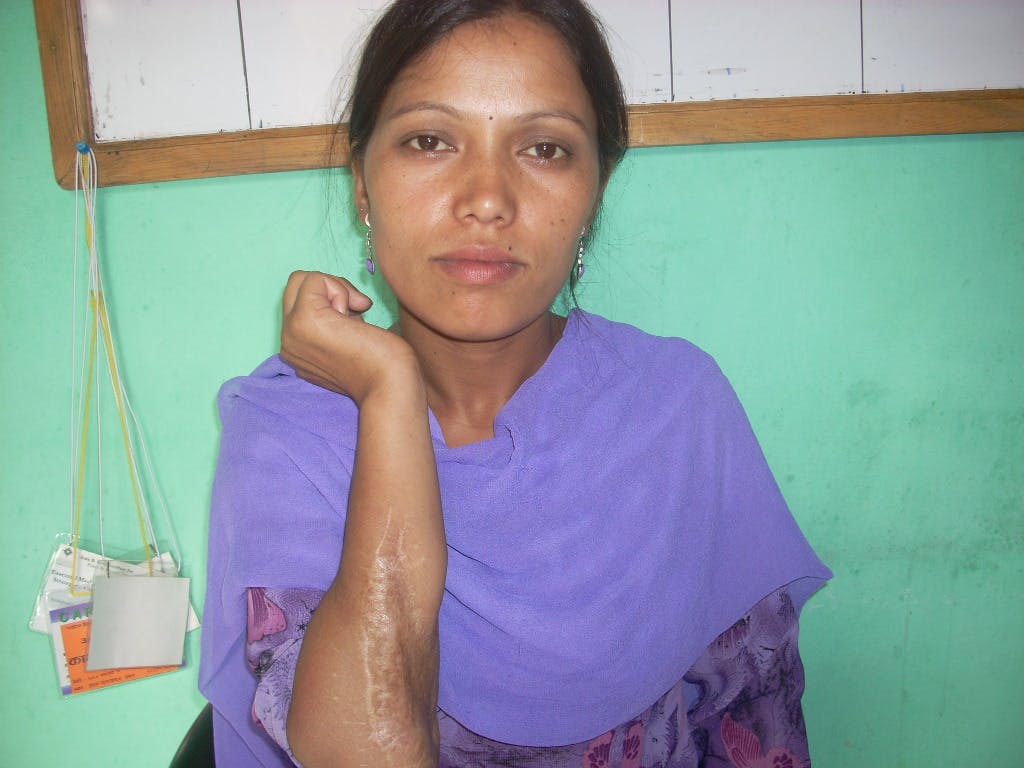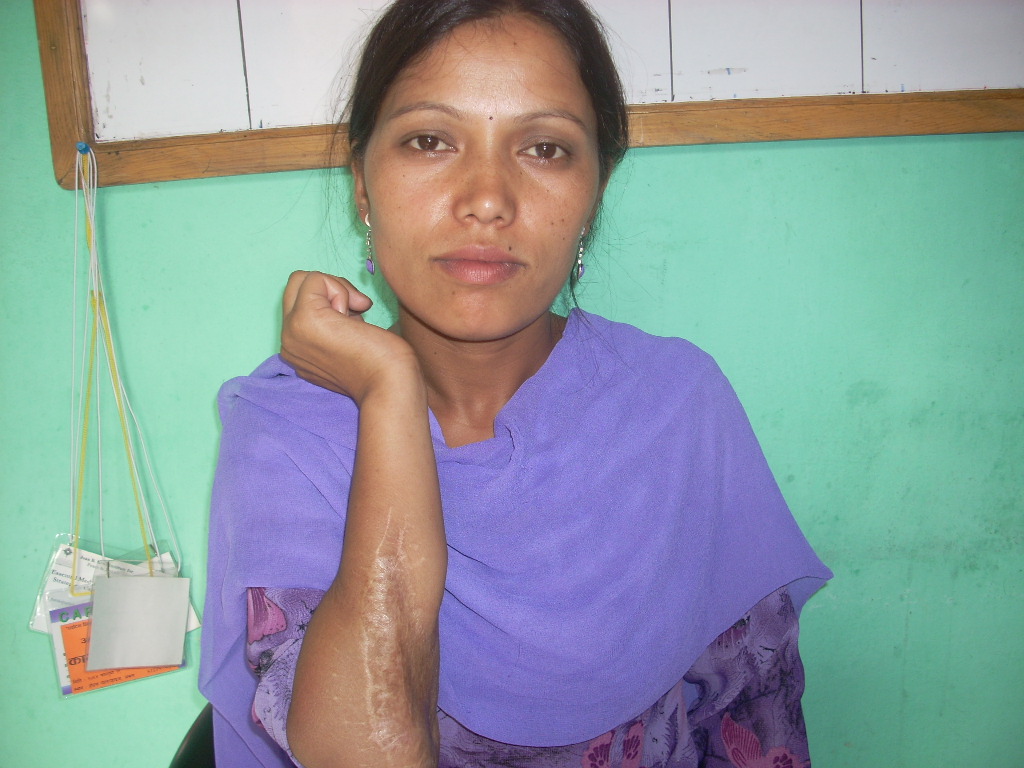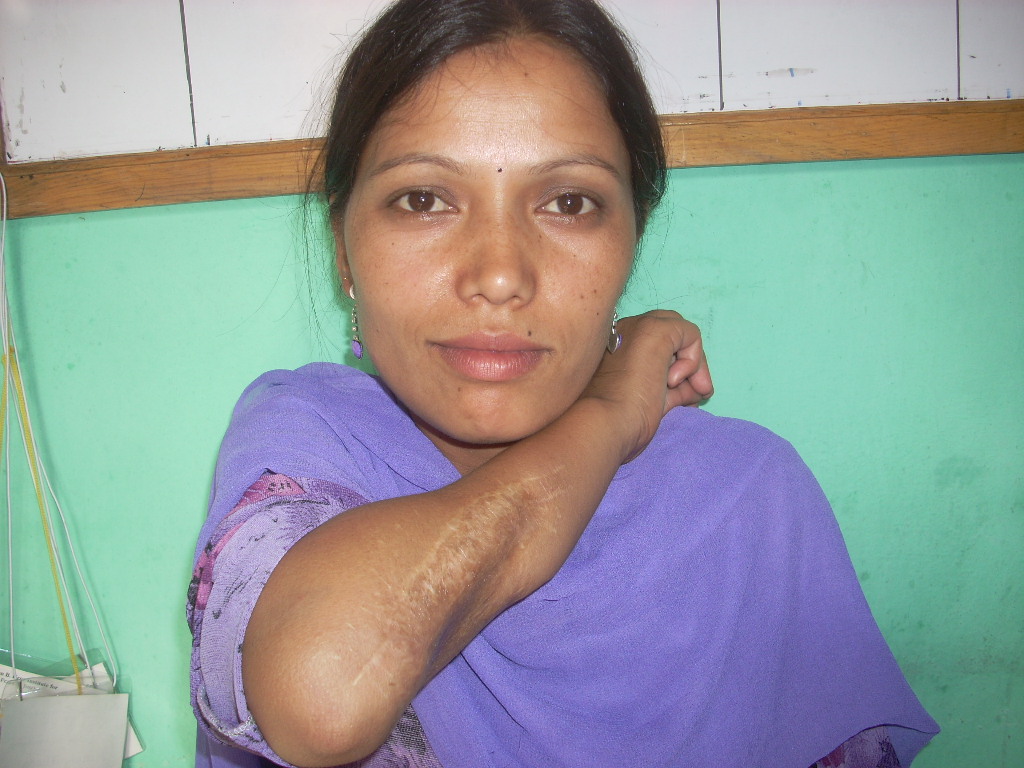Internally Displaced: Waiting For A Normal Life
Jan 21, 2015
Story



At first glance, she looks just like you and me, like any other person leading a normal life. But on uncovering the layers of her life, one can discover the sorrows hidden deep within, the bitter experiences she doesn’t deserve, and being punished for crimes not committed. Pushpa Basnet (Sushmita) lost her right arm when she was hit during crossfire of the Maoists and the army in a battle at Malkharka, Okhaldhunga five years ago, while she was returning home after collecting fodder for her cattle. Considering her an ally of the Maoists, the army disregarded her, but after incessant request of villagers, and umpteenth convincing, she was flown to Kathmandu by the army in a helicopter. It took her one year to recuperate at Chhauni hospital.
Although she was discharged, her arm was still recovering with a steel shaft in it. After one year, the doctor insisted to amputate her arm. But she was not ready for it; she did not want to live with an arm gone.
“Although I do not look like a disabled, I cannot use my right arm to do anything. The doctor has said that if I use my arm for performing work, it will break off. I live with this day in and day out, but I have decided to move on and fight for what is mine,” shares the undaunted Pushpa, who has not let her handicap deter her. “It is the government’s responsibility to provide relief to people like me, who have been victimized because of conflict. It is unfair that the government is shying away from its responsibility and paying no heed to our concerns,” she adds.
Like Pushpa, there are many men and women, who have fallen prey to the decade long conflict, launched by the Maoists in 1996, with the aim of overthrowing the constitutional monarchy and establishing a socialist republic. The insurgency that started in mid-western regions of the country spread to 73 of the 75 districts. Threatened by an environment of increasing violence, harassment and intense political pressure from Maoists rebels and government security forces, people were forced to flee to the surrounding jungles or melted into the cities of Nepal, resulting in staggering number of Internally Displaced People (IDPs).
In March 2005, Global IDP Project of the Norwegian Refugee Council placed Nepal among the countries worst affected by displacement, alongside Sudan, Uganda, Iraq and Somalia. The assessment was based on the combination of indicators including type of displacement, number of IDPs, access to protection and assistance, security situations and government responses.
According to UN IDP Protection Group, 50,000-70,000 people remain internally displaced due to Maoist insurgency. Of them, 50 percent are reported to be women. Despite the overwhelming number of IDPs, humanitarian aid for them is grossly inadequate. In its quest to settle the displaced, the government introduced a return and reintegration package in October 2007 under the IDP Policy, but focused only on those IDPs who were willing to go back to their place of origin. No provisions/dispositions are set aside for those willing to integrate within their displacement area or to resettle elsewhere in Nepal. The state policy, therefore, is not in line with the reality in which more that 60 percent of the IDPs do not want to integrate, and to a lesser extent, resettle. (Distant from Durable Solutions: Conflict Induced Internal Displacement in Nepal, June 2009).
“There are many IDPs who did take the relief given by the government to return home, but finally opted to return to the place of displacement. It is likely that most IDPs chose urban homelessness over rural insecurity. Additionally, their decision to resettle in the place of displacement is coupled by livelihood problems, low social acceptance, and lack of economic opportunities in their place of origin,” shares Ms Geeta Gautam, Senior Officer at INSEC, a human rights organization in Nepal. “The issue of displaced people has not fallen under national priority,” she laments.
“Just providing relief is also not enough. It is government’s responsibility towards the restoration of their confiscated properties, skills development, and employment generation,” said Ms Gautam.
The problem of IDPs is much more severe and complicated that it may seem at the first stance. It is implausible that the issue of displacement has a lot of politics and corruption involved. When each IDP is facing the same dire conditions, IDPs with political connections can easily be registered, while a “normal” IDP has to struggle hard to get what is deserved. Additionally, there is ineffective coordination at the district levels. The Chief District Officers have put a deadline for the registration of IDPs, and IDPs that are not registered will not be entitled to receive aid from the return relief benefits package nor will be eligible for future resettlement and integration packages. This sounds absurd, because registration should not be subject to deadlines.
As the victims of war, both men and women suffer, but it certainly won’t be an exaggeration to say that the effect of conflict on women has been two-fold. The situation of women needs to be understood in the context of women’s status in Nepal, which is a conservative and patriarchal society, where women are still perceived as second class citizens by the judiciary and society at large. The impact of the displacement on women is enormous. They flee into uncertainty and often into danger, as they have to fend for themselves and support their dependants with few resources or belongings.
The displacement has altered the structure of families and households and has changed gender roles. Many adult and adolescent males are separated from the family as they had to stay behind to maintain land or migrate in search of work. Many were forced to serve, or are suspected to be serving as combatants and as a result are susceptible to go missing, be killed or become disabled in combat. The number of female headed households, as a result, has increased significantly. This has not only placed a very heavy burden on women as the sole supporters of their families, but has also made it difficult for them to fully discharge their responsibilities as a result of limited economic opportunities and discriminatory practices.
The problems that Internally Displaced Women (IDW) face are many. Their suffering ranges from psychological trauma to sexual abuse. The stress of displacement often increases the incidence of domestic violence, including spousal abuse and marital rape. Consecutively, large numbers of IDW suffer psychological and physical trauma.
With little or no education and meager skills, these already vulnerable women with limited opportunities have been forced to enter hostile environments in their desperation for work to support their families. Since majority of these women lack education, the business in these hostile environment provide needed income, but at a high price. Many displaced women, especially those who came to Kathmandu are working in cabin restaurants, dance bars, and massage parlors. At such places, they are at a high risk of suffering from Sexually Transmitted Diseases (STDs) including HIV/AIDS.
According to a research conducted by Raksha Nepal, most of the IDPs, especially women, are in risky jobs like cabin and dance restaurants, garment industries, and massage parlors in Kathmandu—forced into these jobs as a result of post-conflict economy. Poverty, homelessness, and lack of any other income–generating activity forced many IDW into this profession.
IDWs are no safer in the camps, where majority of the displaced people reside. In the camps, women face problems with regard to essential health services, water and sanitation services, and collection of firewood/fuel. The environment that surrounds the camps is notoriously dangerous and yet, everyday, women and girls venture out into this danger, risking rape, assault, abduction, theft, exploitation, or even murder in order to collect enough firewood to cook for their families (Beyond Firewood, 2006). In addition, forced recruitment of young women by Maoists along with sexual abuse in Maoist camps and sexual violence against women by the police has been reported in conflict affected areas (Association of Women Journalists, 2002).
Even if IDWs are working in places other than those mentioned, they face sexual harassment and gender-based violence, impeding their personal safety, and security. They are not paid according to the work they do, and are ultimately forced into prostitution by their employers.
Notwithstanding the fact that women and girls typically constitute a significant part of the internally displaced, their particular needs have tended to not sufficiently be taken into account. Before the IDP Policy was launched, pundits said that a proper IDP Policy would help in the process of integration and resettlement of the displaced, but ironically, even after two years of the launch of the IDP Policy, a large number of women are still seeking information on civil documentation, widow’s allowance, property restitution, children’s education and shelter.
The enforcement of Widows Property Rights remains problematic. The Procedural Directives of the National Policy relating to IDP makes specific reference to war widows deprived of their property and notes. One particularly vulnerable group of IDPs is widows of men killed in the conflict, who, together with their children are forced out of their homes by the family of their late husbands. It is state’s responsibility to provide such women with legal and any other assistance necessary to acquire and protect their property rights.
There have been efforts by several national organizations to rehabilitate the girls and women displaced by conflict. One such organization is Raksha Nepal , which is actively working for the empowerment of sexually abused women and for the rehabilitation of those women who have been forced into prostitution and sex trade in the backdrop of dance restaurants and massage parlors. The organization provides the victims with vocational trainings and counseling sessions to help them earn an alternative living. Most of these girls/women are the victims of conflict, who have been forced to flee from their homes.
Menuka Thapa, President of Raksha Nepal said “Internally Displaced Women face economic, social, psychological, and sexual problems during the displacement period. They are not remunerated against the work they do. Their social acceptance is low, especially for women who have lost their husbands.”
“When a woman enters prostitution, she kills a part of herself. Her self-esteem gets degraded, leading to psychological trauma. She is also outcaste from society. The society should, however, understand the background of the situation, rather than just blindly believing what they see,” opined Ms Thapa.
Her prime concern was the government’s tendency to remain indifferent towards the IDPs, and most specifically towards women. “This issue should not take the place of a backburner. Those who have not been reintegrated should be resettled.”
With all the problems faced by the IDWs, it is important to adopt a gender-sensitive approach to take into account the health and psychological needs of victims of sexual abuse and gender-based violence. Special attention should be paid to the health needs of displaced women including reproductive health care, parental delivery and postnatal care, prevention of reproductive tract infections, STDs and HIV/AIDS through counseling, health education and treatment of symptomatic infections.
Basic considerations could also bring about great changes. For instance, women could be consulted and involved directly in provision of supplies of blankets, clothing, heating and cooking fuel, basic water facilities, etc. Additionally, they could be involved in the decision-making process to ensure that housing design, location and construction are better suited to their needs. Camps should be designed and managed in ways that minimize the possibility of rape. If nothing else, simply providing seeds for growing vegetables and grasses within the camps could diminishing the need for women to venture out to collect fodder or firewood.
Pushpa Basnet said, “In 1996, both sides (the Maoists and the army) resorted to arms because of their political rivalry. The political rivalry is still there, but now, if people like me pick guns, it will not be because of political rivalry, but because of our unmet needs, our hungry bellies, and our desperation to lead a normal life.”
Now, it is up to the state to take some action or just wait for the unfolding of a next war.
This article is part of a writing assignment for Voices of Our Future, which is providing rigorous web 2.0 and new media training for 31 emerging women leaders. We are speaking out for social change from some of the most forgotten corners of the world. Meet Us.




